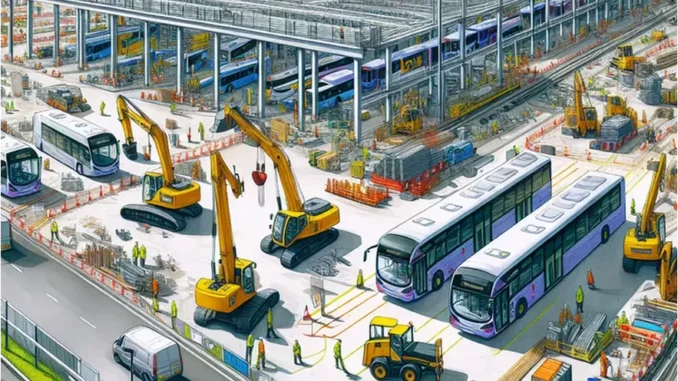
Recently, I had the privilege of conversing with Emily Turner, a project manager at First West of England, to discuss the ambitious and transformative efforts currently underway to electrify bus depots in Bristol and Weston-super-Mare. Her insights provided a captivating glimpse into the multi-million pound initiatives poised to revolutionise public transport in the region.
Air quality is vital in planning. See how Focus360 Energy can assist.
Emily welcomed me with a warm smile and palpable enthusiasm as we settled into a quiet corner of a bustling coffee shop. She began by outlining the sheer scale of the undertaking. “It’s a landmark moment for us,” she remarked, her excitement evident. “We’re looking at a £14.9 million investment in the Weston-super-Mare depot and an astounding £44 million in the Hengrove depot in Bristol. This is the most significant project we’ve embarked on in decades.”
She elaborated on the progress already made, noting that construction equipment had begun arriving at the Weston-super-Mare site, a vast area equivalent to two football pitches located just off the A370. “It’s an enormous space,” Emily observed. “Seeing the first pieces of equipment roll in was truly a ground-breaking moment.” The Weston-super-Mare depot is set to house 24 new electric buses, which will join the network next year.
Delving deeper into the logistics, Emily highlighted the critical role of engineering specialists in the project. “We’re partnering with NG Bailey for the Hengrove depot and Magnus Construction Group for Weston-super-Mare,” she explained. “These teams are pivotal in bringing our vision to life. We’re aiming for completion by March 2025, after which the new electric buses will be rolled out.”
One of the most intriguing aspects of the project is the sheer volume of materials required. “Almost 400 tonnes of steel will be used across multiple gantries to distribute power for charging the new buses,” Emily shared, her eyes wide with emphasis on the enormity of the task. “It’s not just about electrifying the depots; it’s about creating a robust infrastructure that can support our zero-emission goals.”
Emily’s passion for the broader impact of the project was particularly striking. “Electrifying our depots isn’t just a win for public transport; it’s a win for the community,” she stressed. “We’re providing facilities for local companies to charge their electric vehicles, creating green employment opportunities, and offering training and apprenticeships to local people. It’s about building a sustainable future for everyone.”
The partnership with the West of England Combined Authority and North Somerset Council has been instrumental in securing almost £9 million of government funding through the Zero Emissions Bus Regional Areas 2 (ZEBRA2) project. “This collaboration has been crucial,” Emily noted. “It’s a testament to what can be achieved when multiple stakeholders come together with a common goal.”
Discussing the environmental benefits, Emily’s pride in the project’s potential was clear. “These will be the first electric buses in our West of England fleet,” she said. “They’ll provide a comfier, quieter, and smoother ride for customers, but more importantly, they’ll help us deliver a more reliable service that’s better for the environment. We’re committed to having a zero-emissions fleet by 2035, and this project is a massive step towards that goal.”
Emily recounted a poignant moment from the project’s early days. “I remember standing on the empty Weston-super-Mare site, just imagining the bustling depot it would soon become,” she recalled. “It’s one thing to see plans on paper, but to visualise the future and know you’re part of making it happen – that’s something truly special.”
As our conversation wound down, Emily reflected on the significance of the project for the region. “This isn’t just about buses,” she said. “It’s about creating a legacy of sustainable transport that future generations can be proud of. We’re not just changing how people travel; we’re changing how they think about travel.”
Leaving the café, I couldn’t help but share in Emily’s optimism. The electrification of the bus depots in Bristol and Weston-super-Mare represents more than a technological upgrade; it signifies a commitment to a greener, more sustainable future. As the projects progress, they promise to bring lasting benefits to the region, from reduced emissions to enhanced community engagement.
For First West of England, this is the dawn of a new era in public transport – one that prioritises the environment, supports local economies, and offers a more pleasant journey for passengers. And for individuals like Emily, who are at the heart of this transformation, it is an exhilarating journey towards a brighter, cleaner future.


Be the first to comment